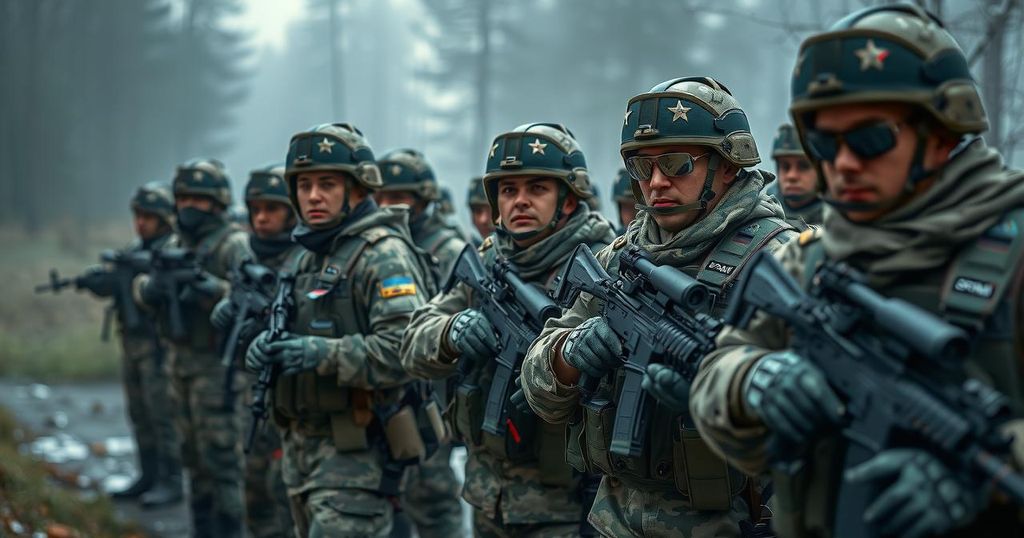Global news
11TH CORPS, ASIA, CANCIAN, CENTER, CENTRE FOR STRATEGIC AND INTERNATIONAL STUDIES, CSIS, DEFENCE, ENERGY INFRASTRUCTURE, EUROPE, EUROPE/ASIA, KOREA, NORTH, KOREAN PEOPLE ' S ARMY, MARK CANCIAN, MICHAEL MADDEN, MILITARY, MILITARY STRATEGY, MOSCOW, NORTH AMERICA, NORTH KOREA, PYONGYANG, RUSSIA, STORM CORPS, THE PENTAGON, UKRAINE, UNITED STATES, US, WAR, WASHINGTON
Marcus Li
0 Comments
Understanding the Role and Impact of North Korean Troops in Ukraine
North Korean troops are reportedly deployed in Ukraine, potentially taking on combat roles contrary to initial expectations of non-combat assignments. Estimates of troop numbers vary widely, and while the KPA lacks combat experience, elite units may perform adequately under Russian training. The alliance reflects mutual needs: Russia requires manpower, while North Korea seeks economic gain and technology. This development raises alarms in South Korea, prompting considerations of shifts in their military strategy and alliances.
Recent intelligence suggests that North Korean troops are currently deployed in Ukraine, marking a significant involvement in Russia’s ongoing conflict. Initial reports indicated these soldiers would occupy non-combat roles due to their lack of battlefield experience; however, updates indicate that they have engaged directly in combat. Initial estimates by the Pentagon cited around 11,000 North Korean soldiers, but some sources propose a figure as high as 100,000. Despite their considerable size, questions arise regarding the effectiveness of the Korean People’s Army (KPA) on the battlefield, as recent comments from experts indicate that while they are dedicated, they lack practical combat experience. Reports have suggested that these troops, particularly from the elite 11th Corps, may be markedly better prepared than ordinary units, potentially benefiting from additional Russian training in combat scenarios unique to Ukraine. Videos allegedly showing North Korean soldiers being trained in Russia support this notion. Moscow’s need for manpower amidst severe losses in its military operations is clear, prompting recruitment strategies that might include overseas personnel, such as North Koreans, who are expected to receive compensation of $2,000 per soldier monthly. This partnership may also open doors for North Korea to gain Russian technology, which has typically been safeguarded. The dynamics between North Korea and South Korea have further complicated this scenario. South Korean officials express concerns regarding the militarization of North Korea, especially in light of recent escalatory actions between the two Koreas. Seoul has signaled potential shifts in its defense policy, including the possibility of providing military aid to Ukraine, indicating a changing landscape of alliances and military strategy in the region.
The involvement of North Korean troops in Ukraine signifies a notable shift in global military alliances, particularly as North Korea seeks to strengthen ties with Russia amid ongoing tensions and its isolation on the world stage. The deployment follows a history of strained relations on the Korean Peninsula, where South Korea remains vigilant of any enhancement of military capabilities by its northern neighbor. The significance of this troop presence is compounded by the backdrop of the Russian-Ukrainian conflict, where manpower and effective military strategies are of utmost importance. Observers have noted that North Korea’s motivations align with their need for economic sustenance and technological advancements, while Russia is grappling with severe casualties and recruitment shortages.
In conclusion, the deployment of North Korean troops in Ukraine presents a complex interplay of military strategy, economic interests, and geopolitical dynamics. While there are substantial uncertainties regarding the combat effectiveness of these troops, their involvement could enhance Russian military efforts significantly. The situation continues to evolve, with implications for both the Korean Peninsula and broader international relations, particularly concerning military support and defense policies in the region.
Original Source: www.bbc.com




Post Comment